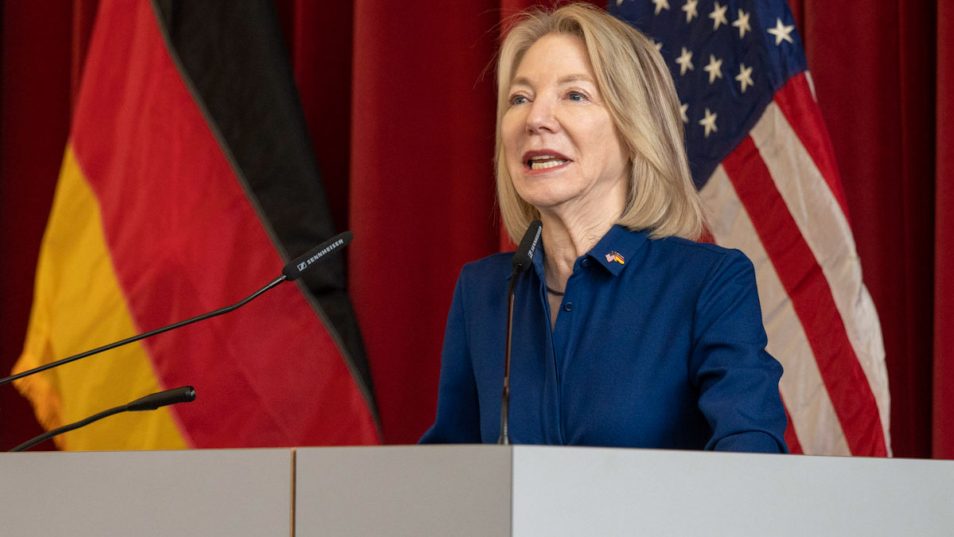Amy Gutmann at Freie Universität Berlin
 © Bernd Wannenmacher
© Bernd Wannenmacher
The new United States Ambassador to Germany held her first official public address at the FU Berlin.
It was just one year ago that Amy Gutmann received a call from Joe Biden. The President of the United States asked her if she would consider being his ambassador to Germany. Biden also mentioned Gutmann’s family background: Her Jewish father was from Feuchtwangen in Franconia, and in 1934 he had to flee Nazi Germany with his family. First they went to India, and after the end of the war he moved to New York, where Amy Gutmann was born in 1949.
Amy Gutmann was the first in her family to earn a college degree. She then made a name for herself as a political scientist. As the president of the University of Pennsylvania, she campaigned to open the elite university to students from low-income families.
“I never dreamed that President Biden would one day call me personally and ask me to be an ambassador to the very country my father once fled,” she said on Tuesday at Freie Universität Berlin, her first major public appearance in the new office. Her father’s courage and foresight saved his family’s lives. “My father instilled in me the absolute importance, the essentialness, of standing up strongly against all forms of hatred, bigotry, and discrimination,” said the 72-year-old diplomat and the first woman ever to head the United States Embassy in Germany.
Revitalizing Good Transatlantic Relations
One hundred guests including some students from the John F. Kennedy Institute for North American Studies, but above all invited representatives of the media and German-American institutions, gathered in a lecture hall in Freie Universität’s Henry Ford Building on Tuesday to hear Amy Gutmann.
The location is symbolic in many respects because without the support of the Americans, it would have been impossible to found the university in 1948. In his welcoming address the president of Freie Universität Günter M. Ziegler referred to these circumstances as well as to the historic speech that John F. Kennedy gave on the Dahlem campus in June 1963 – just a few hours after his famous sentence “Ich bin ein Berliner” (“I am a Berliner”) in front of the Schöneberg City Hall. On a podium set up in front of the Henry Ford Building, he formulated a mission for the young university: “The Free University must be interested in turning out citizens of the world.”
It is fair to assume that the ambassador’s choice of location for her speech on this April morning, almost 60 years after Kennedy’s visit, is in line with Kennedy’s tradition. The location – Freie Universität Berlin – is also an example of how fruitful consistent support and investment in democratic structures can be. What applies to Freie Universität, which was founded with the help of the Americans only three years after the end of the World War II, can also serve as a guiding principle for the present.
Ambassador Gutmann also spoke about the war in Ukraine. She left no doubt about her belief that Russia’s war of aggression would permanently change the world. She gave her speech in English, but repeatedly used the German term Zeitenwende. At one point she said, “We are at a critically important juncture in history that requires a creative and vigorous defense of our core values. These values also include the free and robust exchange of ideas that must take place at universities.”
United Allies
Ambassador Gutmann formulated three key goals for her term of office: strengthening alliances, innovating inclusively, and defending democracy, so that as many people as possible can contribute to solving global problems.
She said, “Together with partners and allies, we will impose on Mr. Putin increasingly high costs for his brutal war of choice.” She called the German federal government’s decision to invest 100 billion euros in the Bundeswehr “bold and historic,” emphasizing that it is not just about modernizing the armed forces, but about defending democracy.
Ambassador Gutmann indicated that she understands Germany’s reluctance to impose an immediate embargo on Russian oil and gas. In the question and answer session, she told moderator Michaela Küfner from Deutsche Welle, “We must not do things that would hurt our citizens or us more than it would hurt Mr. Putin.” She also said she has the impression that Germany is doing everything it can to become independent of gas from Russia as quickly as possible.
According to the ambassador, every challenge always presents opportunities. She is convinced that this is not a naive American idea, but the truth.
Involving the Next Generation
Ambassador Gutmann found many words of praise for the German-American partnership. As an example, she pointed out that it will be necessary to work together to take action against China’s “unfair trade practices and human rights abuses.” She said China has the choice to be “a competitive partner that plays on fair ground with the West” or “an adversary to our values and ideals.”
Gutmann sees her own role not only as an envoy of the United States in world politics. She is especially interested in talking to young people. She is impressed by the creativity and commitment of young people in both Germany and the United States, regardless of whether it is about the “green economy, human rights, or humanitarian aid.” She loves exchanging ideas with those “who will shape our future.” This has long been a matter of concern for her, even before she became the president of a university.
During the discussion with the audience, Ambassador Gutmann expressly encouraged a student from the John F. Kennedy Institute at Freie Universität to contact the Embassy with her own suggestions: “All you have to do is reach out to the Embassy, and we will connect you.”
This article was originally published in German on April 7, 2022, in campus.leben, the online magazine of Freie Universität Berlin.
